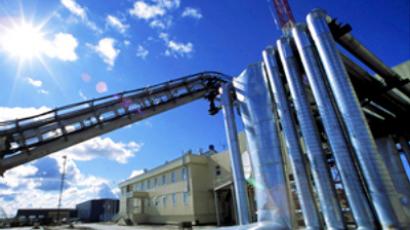Gazprom lays on the gas to power Sochi 2014
The construction work involved with Sochi’s preparations for the 2014 winter Olympics are putting extra pressure local gas demand, but Gazprom is stepping into the breach with a 160 kilometre undersea pipeline.
With eyes turning to the 2014 Olympics, energy is a critical issue for the southern Russian city. With venue construction work underway, an influx of workers is boosting immediate demand, and in the longer term there will be the thousands of spectators.
That’s a major boost to the demand outlook, for both electricity and gas, leading Gapzrom to commit to construction of an undersea pipeline. Matvei Geller, Chief of special projects at Gazprom, says it will change the energy balance for the region.
“There are areas along the coast near Sochi where gas covers only 2 percent of the requirement. Whereas Russia's average is 62 percent. The launch of this new Djugba-Lazarevskoe-Sochi pipeline will significantly solve energy problems in and around Sochi.”
The project will feed into the local power network with a new gas powered electricity station under construction. With timeframes tight, every day, and the regions fickle spring weather, counts according to David Owen, supervisor of the C-Master pipe laying ship.
“Weather is very, very major factor which gets looked at probably 3-4 times a day. At the moment we are averaging about from 2.3 to 2.5 kilometres a day. So when the Olympics light that torch we can say to our children and grandchildren we put that flame there.”
The project could have a further upside for Gazprom. Radu Petrescu, public relation deputy at GSP, says that with the region a key gas transit route, focus is also turning to its potential for production.
“We have some estimation that said that the reserve of hydrocarbons in the Black Sea are equivalent or even higher than the reserves on the North Sea.”
Gazprom’s investment now will help ensure that energy wont be an issue for the athletes and spectators in 2014, and add to the energy security for the rapidly growing tourist destination afterward. And the possibility that it may help open up a new gas production region for Russia is another key economic spinoff from the Sochi winter Olympics.













